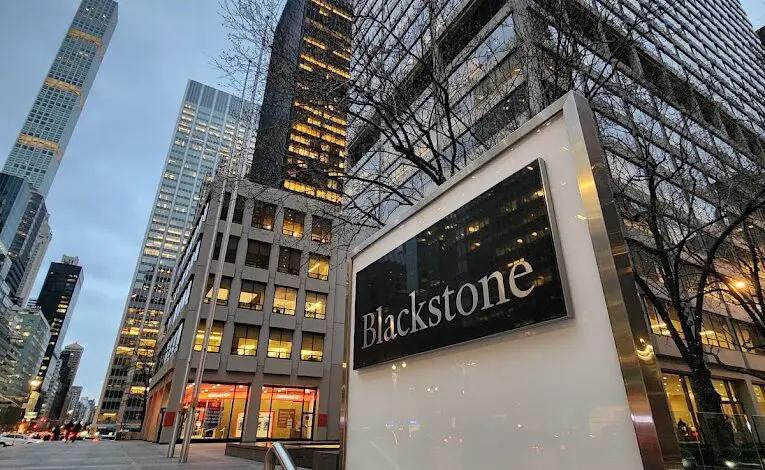
Blackstone (NYSE:BX) Stock Drops to $115 – Is This the Best Buying Opportunity in 2025?
Will BX recover as interest rates stabilize, or is the market still overpricing its premium valuation? | That's TradingNEWS
Blackstone (NYSE:BX) Faces a Defining Moment – Is This a Buy, Sell, or Hold?
Blackstone’s Stock Near $115 – A Market Overreaction or a Golden Opportunity?
Blackstone (NYSE:BX), the largest alternative asset manager in the world with over $1.1 trillion in AUM, has seen its stock slide to $115, down from recent highs of $133. The selloff has been fueled by shifting rate expectations, investor concerns over fee compression, and some softness in real estate investments. But does this decline represent a temporary dip, or is Blackstone still too expensive at current levels?
At a 37x earnings multiple, Blackstone remains a premium-priced stock in an environment where investors are questioning valuations. However, its alternative investment model, massive cash reserves, and robust private credit business continue to deliver strong long-term growth prospects. The firm deployed $134 billion in 2024, up 81% year-over-year, positioning it for significant fee growth in 2025 and beyond.
With $9.7 billion in cash, a 2% dividend yield, and dry powder reserves exceeding $168 billion, Blackstone is well-positioned to weather market volatility. But with interest rate uncertainty and a cooling M&A cycle, does the stock still justify its valuation?

Blackstone’s Fee Revenue Model – Why BX Remains a Long-Term Winner
Blackstone’s business model is built around fee-based revenue, which provides a recurring and scalable cash flow stream. Over 90% of its AUM generates fee-related earnings, giving the firm a predictable revenue foundation.
In Q4 2024, Blackstone reported $1.2 billion in fee-related performance revenue, primarily driven by its infrastructure and real estate investments. While total AUM climbed to $1.1 trillion, investors remain cautious about whether fee growth can outpace macroeconomic headwinds.
Here’s what matters: Blackstone is a cash machine, with its fee revenue tied to long-term investments across real estate, private equity, hedge funds, and private credit. The firm isn’t reliant on short-term stock market performance, making it more resilient than traditional asset managers like BlackRock (NYSE:BLK).
Blackstone’s Real Estate & Private Equity Exposure – Should Investors Worry?
One of the key concerns driving BX stock lower is the uncertainty in real estate markets. Blackstone’s real estate AUM reached $315.4 billion, with $8.1 billion in inflows during Q4. However, rising borrowing costs and softening property valuations have led to increased investor skepticism.
Blackstone’s BREIT (Blackstone Real Estate Income Trust) has seen redemption requests exceed new investments, highlighting investor hesitancy in the real estate sector. However, Blackstone has been actively repositioning its portfolio, moving into data centers, logistics, and infrastructure-focused assets, which have higher long-term growth potential.
Meanwhile, the private equity segment remains a core driver of Blackstone’s earnings, with $352 billion in AUM and $41.3 billion in inflows in 2024. The firm continues to expand its energy transition and infrastructure investments, making it well-positioned for long-term value creation.
The big question: Will rising interest rates further impact real estate valuations, or has Blackstone already adjusted for the downturn?
Blackstone’s Credit & Insurance Business – The Growth Engine for 2025 and Beyond
One of the most underappreciated aspects of Blackstone’s business is its private credit division, which has been a standout performer amid higher interest rates.
The firm’s private credit portfolio returned 15.7% on a gross basis in 2024, far exceeding traditional fixed-income investments. With $450 billion in credit and insurance AUM, Blackstone is the largest third-party private credit manager in the world.
In Q4 alone, Blackstone deployed $21.6 billion into direct lending and infrastructure-based credit strategies, reinforcing its commitment to high-growth alternative lending.
The real driver here? Institutional investors continue to flock toward private credit as an alternative to traditional bond markets, and Blackstone is leading this trend.
Blackstone’s M&A Cycle – What’s Next for Deal Flow?
M&A activity is critical to Blackstone’s business model, as it drives private equity deal-making, fund realizations, and new investment opportunities.
However, 2024 was a slow year for global M&A, driven by higher financing costs and tighter credit conditions. Blackstone’s management expects a major rebound in M&A deals in 2025, citing lower borrowing costs and an improving regulatory environment.
According to Blackstone President Jon Gray:
"We’re seeing the early signs of a strong M&A cycle returning, with private market transactions accelerating into 2025. We expect a resurgence in deal-making across private equity and real estate."
If M&A activity picks up, Blackstone’s private equity and real estate investments will see a significant earnings boost.
Key question: Will lower interest rates be the catalyst Blackstone needs to fuel its next wave of high-return deals?
Is Blackstone Stock Overvalued or a Long-Term Buy?
Despite recent weakness, Blackstone remains a long-term compounder.
The stock has pulled back 18% from its highs, but its fee-driven model, massive capital reserves, and expanding private credit business keep it well-positioned for future growth.
At 37x earnings, BX is expensive relative to traditional asset managers, but compared to the broader alternative investment space, its valuation is more reasonable.
If interest rates decline in the second half of 2025, Blackstone could see a major resurgence in AUM growth, deal-making, and performance fees.
However, if rates remain elevated, BX may continue to face short-term headwinds.
So, is Blackstone a buy at $115, or should investors wait for a better entry?
Final Verdict: If you’re a long-term investor, BX remains a strong buy on any weakness. If you’re waiting for short-term catalysts, keep an eye on M&A activity and rate trends.
















